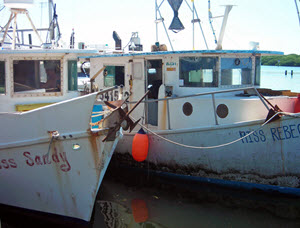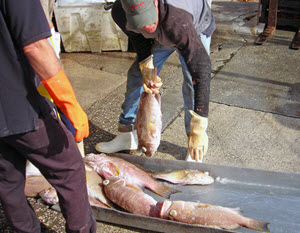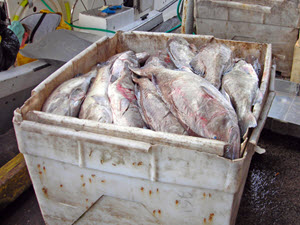
Fishing vessels used to capture reef fish rest at port. (Photo by Steve Saul)
Authorities closed large portions of the Gulf of Mexico to commercial and recreational fishing following the Deepwater Horizon oil spill to contain and mitigate oil contamination of fish and seafood products. The fishing closures may have caused many fishers to search for alternative income solutions, such as relocating or chartering their vessels for the cleanup process.
The Gulf of Mexico Research Initiative recently awarded Dr. Steven Saul a grant to investigate how these closures and the effects of oil pollution may have influenced the fishing community’s livelihood and how their responses may have affected resource assessment. “Scientists are conducting important research on the chemical and ecological effects of the oil spill. However, this event affected not only the environment but also people’s lives and livelihoods, which are predicated on having a healthy ecosystem,” said Saul.

Fishers offloading a catch of yellowedge grouper from a fishing vessel near Tampa. (Photo by Steve Saul)
Saul’s team will use questionnaires to survey spill-affected fishers about their decisions, the factors that most heavily influenced those decisions, and whether changes were short-term (lasting only during the closures) or long-term (permanently altering their fishing behavior). The researchers will combine their data with National Marine Fisheries Service data, which includes commercial fishers’ reported activities for stock assessment, and expand an existing West Florida Shelf simulation model to include species and fishing fleet activities from the Florida Keys to the United States-Mexico border.
The enhanced model will help researchers predict the spatial patterns of fishing effort, catch, and abundance for fleets and marine species under various scenarios, including oil spill events. The researchers will also use their model to determine if the closures and any resulting changes in fishing activities affected fishing industry data collection and, in turn, the assessment of fish resources.

Red grouper freshly offloaded from a bottom longline vessel fishing near Tampa. Red grouper is one of four reef fish species included in the project’s model. (Photo by Steve Saul)
Saul hopes the improved model will help characterize the spill’s impacts on fishing communities and provide valuable lessons learned about how agencies can best respond to such events. “Our research is essentially addressing how the natural and human systems are coupled and how the effect on one system pushes back to affect the other and vice versa. They are inextricably linked.”
The project’s researchers are Steven Saul and Sam Purkis of Nova Southeastern University and David Die of the University of Miami. Their project is Avoiding Surprises: Understanding the Impact of the Deepwater Horizon Oil Spill on the Decision Making Behaviors of Fishers and How This Affects the Assessment and Management of Commercially Important Fish Species in the Gulf of Mexico Using an Agent-Based Model.
************
The Gulf of Mexico Research Initiative (GoMRI) is a 10-year independent research program established to study the effect, and the potential associated impact, of hydrocarbon releases on the environment and public health, as well as to develop improved spill mitigation, oil detection, characterization and remediation technologies. An independent and academic 20-member Research Board makes the funding and research direction decisions to ensure the intellectual quality, effectiveness and academic independence of the GoMRI research. All research data, findings and publications will be made publicly available. The program was established through a $500 million financial commitment from BP. For more information, visit http://gulfresearchinitiative.org/.
